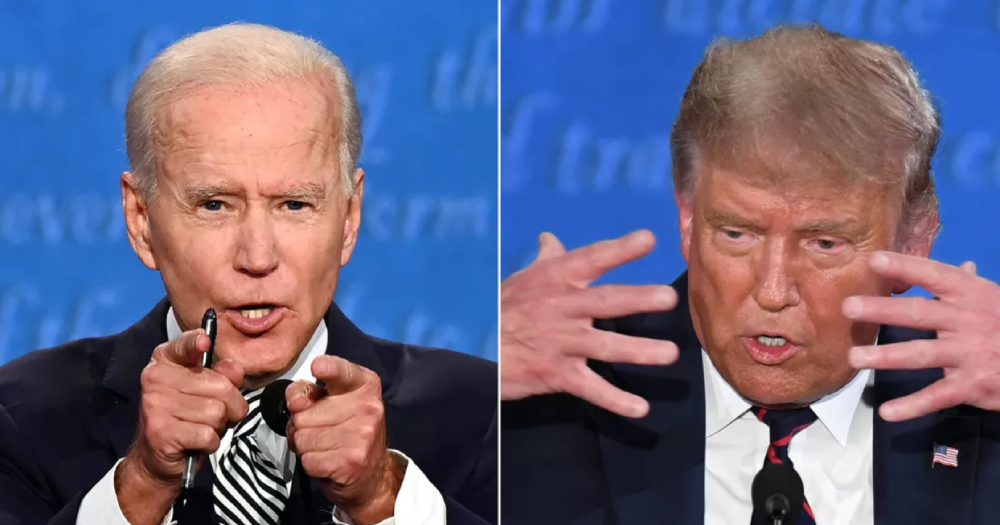The second and final debate for the U.S. presidential election was a much more calm and intelligible affair than the first, perhaps due to the threat of either candidate being muted to prevent interruptions.
However, this was not perfectly enforced, with U.S. President Donald Trump and former Vice-President Joe Biden able to get in a few pot shots at each other during the debate on Oct. 23 morning (Singapore time).
Still, they made better policy pitches as compared to the first debate, which was described as a "chaotic mess", although they were not anything new.
And while foreign policy has been bipartisan most of the time in American history, the two candidates still faced differences in their views of the world.
Here is what Trump and Biden said on their respective stances towards the country's foreign policy.
On China
Blaming China for the pandemic
The Covid-19 pandemic remained a mainstay of the debate -- despite the Trump campaign opposing it before the debate started -- and Trump continued to attribute the Covid-19 pandemic to China.
Although he said he would "take full responsibility" for the pandemic when Biden accused him of doing so, he continued to say: "It's not my fault that it came here, it's China's fault."
The virus has infected about 8 million in the U.S., and taken more than 221,000 lives so far.
On the topic of the trade dispute with China, when Biden claimed that tariffs were mostly paid by U.S. taxpayers, Trump retorted that China is the taxpayer.
Biden on forcing China to play by international rules
Matching up to Trump's tough rhetoric on China, Biden also appeared to go hard on the country.
He said should he become president, he would force China to "play by international rules" when it came to the issues of trade and its behaviour in the South China Sea.
He threatened that U.S. bomber planes would "fly through" Chinese identification zones, which has already happened under the Trump administration.
He also tried to set himself apart from Trump -- taking some jabs at him in the meantime -- saying Trump "embraces guys like thugs like [Kim Jong Un] in North Korea and the Chinese President [Xi Jinping] and [Russia's Vladimir] Putin and others, and he pokes his finger in the eye of all of our friends, all of our allies".
He further said the U.S. needs to put collective pressure on Beijing by uniting with its allies.
Both candidates did not go deep into their China policy
However, Biden did not offer additional insight into how he might force China to play by international rules.
According to CNN, the live broadcast of the debate was not censored in China at all, likely because the candidates' comments on China were not seen as harmful to Beijing.
On the South China Sea, Biden had not talked about Beijing's moves in expanding its artificial islands and military presence in the sea.
Both Trump and Biden also did not bring up the issues of Taiwan, Hong Kong and Xinjiang -- matters that Beijing finds politically sensitive.
For a country that is the world's second largest economy at the moment, which is also considered by Trump to be the U.S.'s main competitor, the failure of both candidates to bring up substantial policy points on how they planned to manage the bilateral relationship.
On North Korea
Biden also took aim at Trump's North Korea policy, saying the latter has "legitimised North Korea" by calling "a thug" like Kim Jong Un "his good buddy".
"He talks about how we're better off when North Korea is much more capable of firing a missile that is able to reach U.S. territory," he said.
He further likened Trump's show of appeasement to Kim, saying the U.S. had "a good relationship with Hitler before he in fact invaded Europe".
He said:
"Come on... The reason he (Kim) would not meet with President Obama is because President Obama said, ‘We’re going to talk about denuclearisation. We’re not going to legitimise you. We’re going to continue to push stronger and stronger sanctions on you.’ That’s why he wouldn’t meet with us.”
However, Biden failed to address the criticisms against Obama's North Korea policy in the past.
During the Obama administration -- when Biden served as vice president -- the isolated country advanced its nuclear programme by expanding its arsenal.
On the other hand, Trump said "no" when asked by NBC debate moderator Kristen Welker if North Korea's presentation of a new intercontinental ballistic missile (ICBM) at a military parade on Oct. 10 is a betrayal to his relationship with Kim.
Trump has previously boasted of his personal relationship with Kim, saying they "fell in love" after exchanging "great letters".
Since talks with the U.S. started, however, North Korea has yet to conduct ICBM nor nuclear tests -- something that Trump took credit for, although analysts say it was due to South Korean President Moon Jae In's efforts in diplomacy.
Totally unrelated but follow and listen to our podcast here
Top image via Jim Watson/Getty Images
If you like what you read, follow us on Facebook, Instagram, Twitter and Telegram to get the latest updates.
